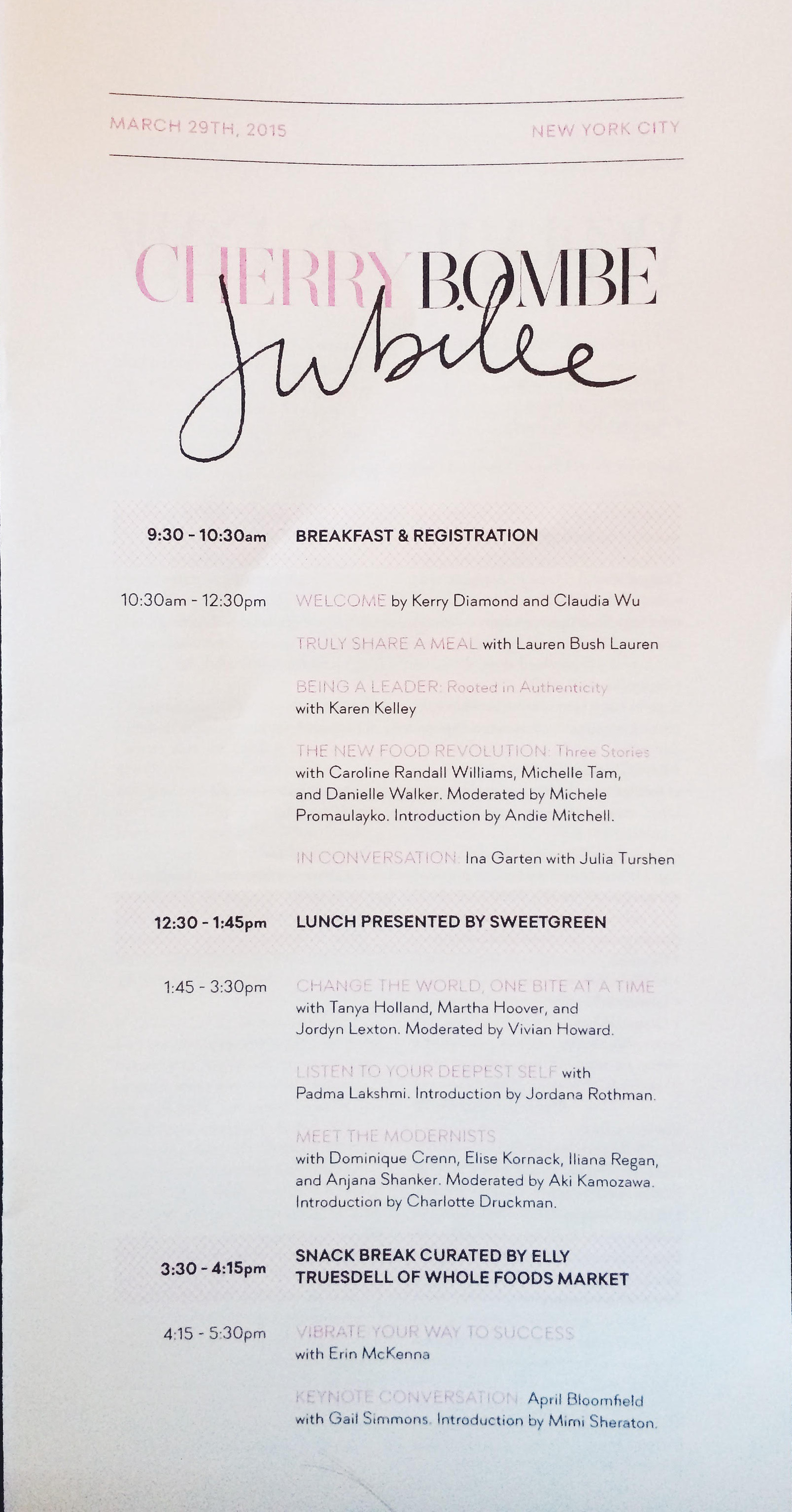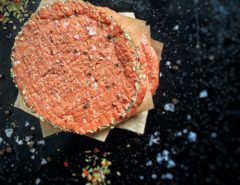 By: Kelsey Tenney
By: Kelsey Tenney
In the food science realm, we rarely leave our cocoon of knowledge and creativity. In fact, we have effectively cut ourselves off from many of the inspiring tastemakers out there while the food world has grown and seeped into the corners of culture. Food is no longer nutrition that gets us from breakfast to lunch. Food has become nourishment for the soul as well. Consequently, the image of the food industry as a whole has become warped and misunderstood through the lack of communication. It is this clash of ideas that has always interested me. I have explored the boundary quite extensively during the last couple of years, and recently, I had the privilege of attending Cherry Bombe Jubilee after being chosen for a complimentary student ticket.
Cherry Bombe is an incredible biannual publication that celebrates print and profiles women in the world of food, writing, art, fashion, and music all through the lens of food. Their goal is to provide “sustenance and style and things that nourish the mind, the eye, and, of course, the stomach.” The founders, Kerry Diamond and Claudia Wu, met while working at Harper’s Bazaar.
Through funds from Kickstarter, Diamond and Wu were able to bring their fashion-meets-food concept to fruition in 2013. Cherry Bombe has featured such legends as Ruth Reichl (former New York Times restaurant reviewer, Editor-in-chief of Gourmet magazine up to the end in 2009, and celebrated author), Christina Tosi (creator of Momofuku Milk Bar), Ina Garten (Barefoot Contessa—I hope you don’t need any further descriptor), and Dorie Greenspan (cult cookbook author and baking icon).
Cherry Bombe has also highlighted influential food scientists! Dr. Lisa Mauer of Purdue University food science was featured in issue 3 speaking about her research with NASA. Dr. Rachel Dutton, a food microbiologist at Harvard shed some light on cheese in issue 1. And in issue 4, Modernist Cuisine scientists and research chefs gave an inside look into Nathan Myhrvold’s iconic laboratory (kitchen?).
In an effort to bring women together and the pages of Cherry Bombe to life, Diamond and Wu created the concept of Cherry Bombe Jubilee. Jubilee is a day-long whirlwind of a conference in New York City held once a year. The second annual Jubilee this year featured the likes of Padma Lakshmi, gluten-free/vegan bakery empire owner Erin McKenna, and superstar chef April Bloomfield as the keynote speaker. Aki Kamozawa—Ideas in Food creator and consultant that champions the use of science in cooking—moderated a panel with modernist cuisine chefs. There were several speakers, however, that we in the food science community can learn from the most.
The very first speaker of the day was Lauren Bush Lauren. Lauren has become an activist for children’s hunger and created FEED Projects in the process. FEED Projects acts alongside the UN World Food Program and sells merchandise that directly benefit children in third-world countries. Recently, FEED has spearheaded a campaign that allows people to donate meals while hosting their own “FEED Supper” gathering. In just one year, FEED Supper has donated two million meals to starving children.
Jordyn Lexton, Tanya Holland, and Martha Hoover are three more women that are using food to do some incredible things. They made up the panel Change the World, One Bite at a Time. Lexton used to teach at Rikers Island jail and saw a need to prevent youth from committing crimes and rehabilitating young adults who have just been released. She founded Drive Change—an organization that is dedicated to empowering young people and teaching them cooking skills through an award-winning food truck in New York. Holland is doing similar things in Oakland with her restaurant Brown Sugar Kitchen. Hoover owns one of the largest restaurant groups in Indianapolis, Indiana that began the farm-to-table movement in the Midwest. In response to food insecurity in Indiana, she has started the Patachou Foundation which provides healthy meals for youth after school.
It is women like this that are moving the food world into a direction that we could all pay attention to. While the commercial food industry does not normally parallel itself with chefs and others that are generally seen as the “glamorous” side of food, maybe we should. The efforts of a few could be multiplied many times over by larger companies. While most companies in the food industry do have honorable volunteer organizations and efforts by employees, these women have made it their main mission.
There were several moments during Jubilee that I couldn’t help but cringe. Because of the closed communication lines, food companies and the food scientists that create products are treated as the enemy. But generalizations go both ways in the food world. Misconceptions on both sides of the fence hinder any possible progress. As the food cold war continues, the gap widens. Because large food companies have mastered efficiency and feed the vast majority of America, the products created by food scientists are responsible for most of the nation’s nutrition. That means that as food scientists, we will touch everyone’s life on a daily basis.
I really don’t mean to say this next bit as if I am getting on my soapbox, but together, food can change everything. Inspiring individuals and organizations require the tools to really have an impact, and large food companies are striving to feed the expanding world and create food products that improve the health of all. However, being open-minded is imperative, and I think it should start with us. We are the most intimidating part of the food industry. As scientists, we are usually labeled as the scariest due to misinformation and poor communication.
Just reading publications like Cherry Bombe and others (Lucky Peach, Gather, and Gastronomica are great as well) and attending events like Jubilee is sure to cause a spark. No longer should we sequester ourselves into our own club. The dialogue is waiting to begin. Join me in ending the food cold war?
http://cherrybombe.com/
 About Kelsey: I grew up in Minnesota constantly in awe of innovative companies like General Mills and Cargill. After touring Cargill kitchens in high school, I decided food science was my niche. I received my Bachelor’s from Purdue University and continued on to The Pennsylvania State University where I am working on a Master’s concentrating in food chemistry. In my free time I love to bake and cook in order to experience food science in all its glory. I recently started the blog www.appeasingafoodgeek.comdetailing my culinary adventures. When I’m not in the lab you can usually find me multitasking between testing a cookie recipe, watching an old episode of X Files, and trying to find my wine glass.
About Kelsey: I grew up in Minnesota constantly in awe of innovative companies like General Mills and Cargill. After touring Cargill kitchens in high school, I decided food science was my niche. I received my Bachelor’s from Purdue University and continued on to The Pennsylvania State University where I am working on a Master’s concentrating in food chemistry. In my free time I love to bake and cook in order to experience food science in all its glory. I recently started the blog www.appeasingafoodgeek.comdetailing my culinary adventures. When I’m not in the lab you can usually find me multitasking between testing a cookie recipe, watching an old episode of X Files, and trying to find my wine glass.






Work on enhancing communication and public education is worthwhile. However, there are limits to what this can accomplish, because there are entities that have no interest in being rational or responsible, and which may have conflicting agendas.
Keep in mind also that American ‘modern journalism’ believes its mandate historically comes from exposure of “crooked” practices in the American food industry – largely as a means of trying to discredit capitalist economic organization. This is how many “news” publishers have sold content for over a century – controversy, simplicity and fear pay, responsible investigation and complex discussion does not. Today’s focus activists are similarly motivated – if they don’t generate controversy, they don’t get paid. We have seen an example of these practitioners on this forum (‘Food Babe’).
This kind of thing (uninformed activism followed by concerted public education efforts) has happened with food science’s ‘sister field’ agriculture. I think agriculture has lost the battle by not being nearly aggressive enough about curbing the questionable influences of “environmentalists,” “eco-warriors” and “food advocates” over the last 50 years. These people now draw on billions of dollars, run the show over at the EPA, control much of the media, and exert significant impact on agriculture, in the pursuit of some very questionable aims (which, as it transpires, have nothing to do with sound environmental practice, food safety, or conservation).
Thank you for the comment Dave! I do agree with several points you have made. First, there is likely to be a “sensationalist” aspect to journalism when it comes to large food companies. Unfortunately, this is inherent in all aspects of reporting, but food companies are an easy target due to the huge amount of product that goes out the door every day. Second, mistrust of large companies in general will always be a huge barrier. Big Ag, as you mentioned, is especially eligible for these campaigns.
However, I tend to think that your assessment of the bulk of the public is a little too black and white. Recently, it has been shown that people are interested in the science of their kitchen. The Food Lab (a column of Serious Eats), for example, was nominated for a James Beard Award this year due to its extremely popular content. There are also a large number of food science cookbooks set to be released in the coming years that are already gaining traction. Molecular gastronomy, while extremely minor in this sense, has piqued the interest of many as to how ingredients work. Xanthan gum has become a household name across the country.
For me, this interest in science shows promise. While it may be impossible for everyone to see eye to eye, I truly do believe that most people fear some of the food on the grocery shelves because they just don’t know what’s there. Maybe it’s because I am more of a glass-half-full type person, but I think opening up the conversation could work to counteract some of the negative aspects of perception of the food industry.
There will always be the Food Babes, but we should not assume that everyone is against us and “irrational” in their thinking.